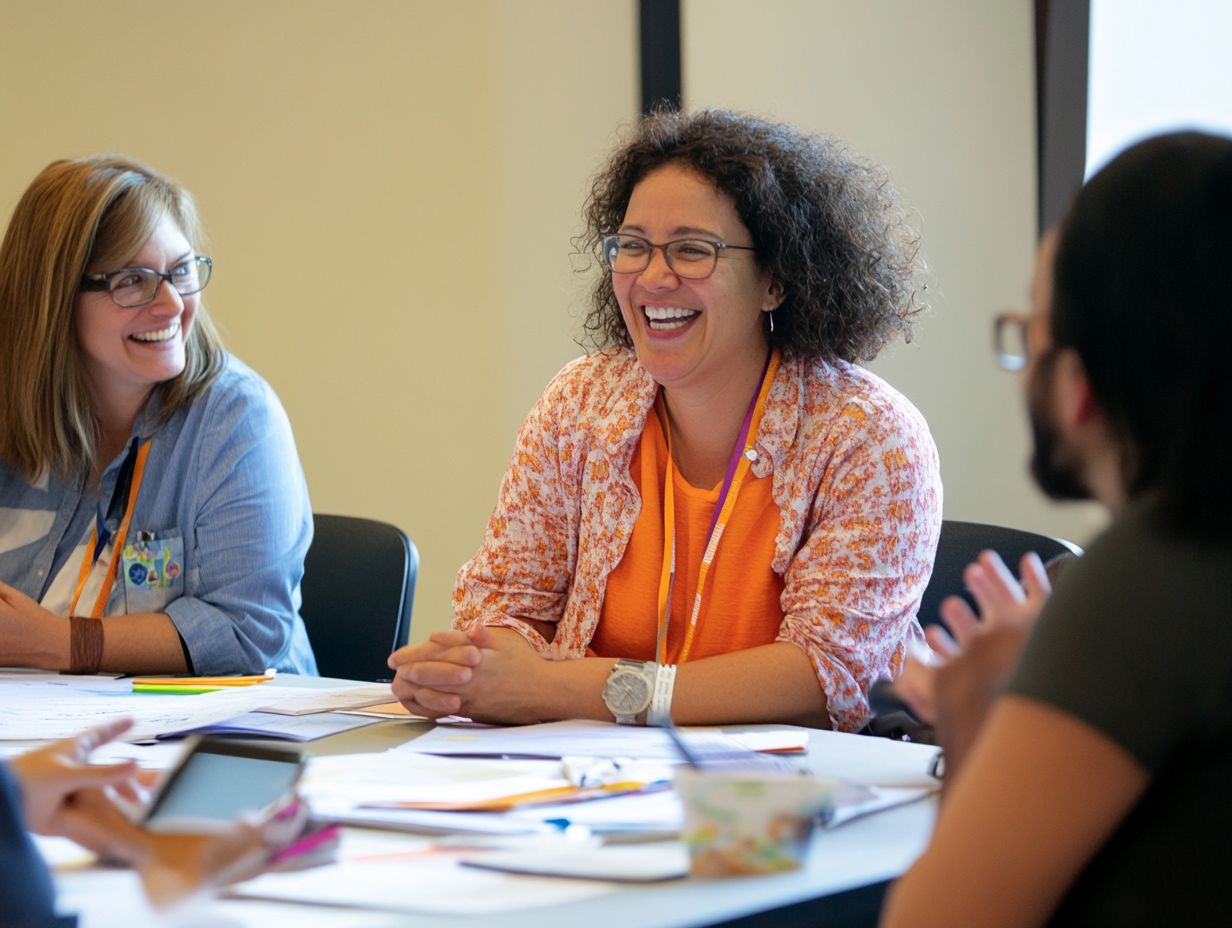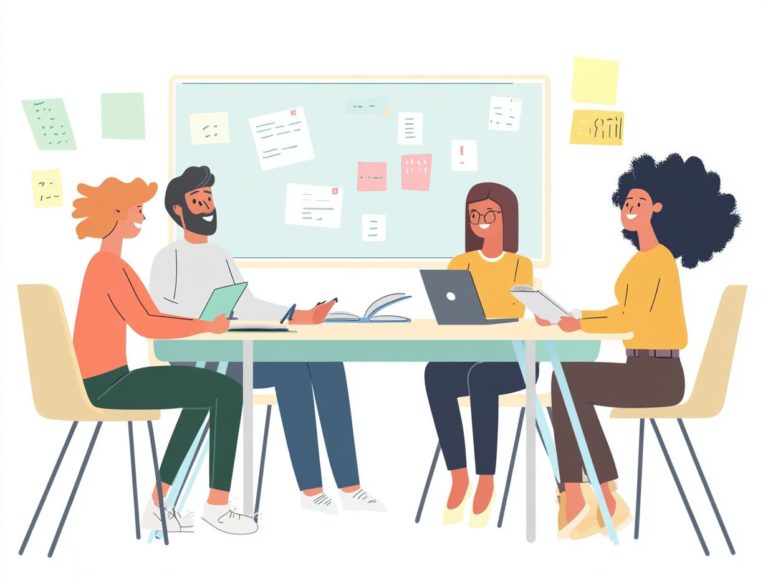using role-playing to practice conversational skills
Role-playing serves as a remarkable tool that can elevate your communication skills. By getting involved in different situations and taking on various roles, you can enhance your conversational abilities in an enjoyable and engaging manner.
Explore the exciting benefits of role-playing! This exploration reveals many benefits, including improved communication and increased confidence, along with practical tips for effective practice.
You ll also encounter common challenges, such as nervousness, and discover techniques to further hone your conversational skills. Join us on this exciting journey to uncover how role-playing can transform your interactions!
Contents
- Key Takeaways:
- What is Role-Playing and How Does it Help?
- Benefits of Using Role-Playing for Conversational Skills
- How to Incorporate Role-Playing into Conversational Practice
- Common Challenges and How to Overcome Them
- Other Techniques for Improving Conversational Skills
- Frequently Asked Questions
- What is role-playing and how does it help practice conversational skills?
- What are the benefits of using role-playing to practice conversational skills?
- How do I get started with using role-playing to practice my conversational skills?
- Can I use role-playing to practice conversational skills on my own?
- What are some tips for effective role-playing to practice conversational skills?
- How often should I use role-playing to practice my conversational skills?
Key Takeaways:
- Role-playing can help improve communication and social skills by providing a safe and supportive environment to practice conversations.
- Incorporating role-playing into conversational practice can increase confidence and comfort in real-life conversations.
- Effective role-playing involves setting up scenarios and roles, and utilizing active listening, which means truly paying attention to what others say, empathy, and body language skills.

What is Role-Playing and How Does it Help?
Role-playing is an engaging and interactive approach that you can use in language learning, allowing you to simulate real-world situations. This method enhances your speaking fluency and helps you acquire language skills through contextual learning.
By stepping into various roles, you practice authentic conversations while receiving constructive feedback from your instructors. This ultimately boosts your language skills and confidence in communication.
This experiential strategy creates a dynamic learning environment where you can navigate social situations and refine your communication tactics. This technique holds particular significance for you, as it encourages active participation, which can be pivotal for language retention.
Consider scenarios like ordering food at a restaurant or negotiating a business deal. These not only immerse you in relevant vocabulary but also challenge you to think critically and adapt your language use to different contexts.
The collaborative nature of role-playing fosters peer interaction and builds a sense of community, making language learning feel less intimidating. Language instructors appreciate this method for its effectiveness in keeping you engaged, transforming traditional learning into enjoyable and memorable experiences that ultimately promote greater proficiency.
Benefits of Using Role-Playing for Conversational Skills
Utilizing role-playing to practice conversational skills in language classes presents a wealth of advantages for developing these essential abilities. It boosts student motivation by immersing them in realistic group exercises that encourage active participation and foster valuable feedback.
Improved Communication and Social Skills
Role-playing significantly enhances your communication and social skills by immersing you in interactive dialogues that closely resemble real-life social situations. This approach not only facilitates language acquisition but also fosters deep learner engagement.
Through these dynamic scenarios, you practice vocabulary and grammar while navigating the complexities of human interactions. This ultimately boosts your social-emotional competencies.
For instance, when you participate in a role-play activity simulating a job interview, you re not just honing your language skills; you re also learning to convey confidence, empathy, and active listening.
Engaging in a mock negotiation challenges you to articulate your thoughts clearly while understanding others’ perspectives. These immersive experiences cultivate improved self-awareness and emotional regulation, laying a solid foundation for effective communication in academic settings and the real world.
Increased Confidence and Comfort in Conversations
The practice of role-playing builds your confidence and creates ease in conversations, allowing you to experiment with various communication strategies without the worry of being judged.
In this supportive environment, you can immerse yourself in different scenarios, exploring diverse perspectives and reactions. This engagement encourages you to think critically about your responses while enhancing your ability to navigate social situations.
As you interact through these imaginative exchanges, you re likely to experience a significant decrease in anxiety, making you more willing to participate in genuine dialogues beyond the classroom.
The resulting positive psychological impact ignites your enthusiasm to connect with peers, fostering a collaborative spirit that enriches your overall educational experience.
How to Incorporate Role-Playing into Conversational Practice

Incorporating role-playing into your conversational practice means designing activities that use effective teaching resources.
Structure group exercises and virtual pair work to foster interaction. This approach transforms routine practice into dynamic exchanges.
Setting Up Scenarios and Roles
Set up role-playing scenarios that resonate with common social situations. This enriches the learning experience in your language classes.
Start by identifying everyday situations you encounter. Consider contexts like a job interview or a casual chat at a social gathering.
As a teacher, guide students through each scenario. Help them create dialogues that reflect real-life conversations, ensuring the vocabulary is appropriate.
Facilitate practice in a supportive environment. This helps learners build confidence and fluency for real conversations.
Tips for Effective Role-Playing
Make your role-playing sessions successful by using tools that enhance communication skills. Encourage helpful comments and clear assessment criteria.
Set specific learning goals at the beginning. This creates a focused framework that guides your students throughout their role-play experiences.
As a teacher, provide timely and helpful comments during and after these activities. This helps learners identify areas for improvement and celebrates their successes.
Create an inviting atmosphere that encourages students to take risks. This boosts their engagement and confidence in using the language.
Incorporating various scenarios further enriches the experience. It allows learners to navigate different contexts and enhances their language skills.
Common Challenges and How to Overcome Them
While role-playing offers valuable learning experiences, it can also lead to challenges like nervousness.
These feelings can hinder participation and affect learning outcomes.
Dealing with Nervousness or Embarrassment
To address nervousness, foster an environment of trust and support. This allows students to receive helpful feedback and build confidence.
In this nurturing atmosphere, use ice-breaker exercises to help students interact comfortably. Gradually increase the complexity of role plays to reduce anxiety.
Encourage a culture of positive feedback. This creates a safe space for students to experiment and learn from their mistakes, making role-playing enjoyable for everyone involved.
Handling Difficult Situations or Conversations

Effectively handling difficult situations or conversations in role-playing scenarios equips you with vital communication strategies essential for real-world interactions.
Imagine you re in a role-play where you need to resolve a conflict between two friends who disagree on a project. Through this exercise, you ll learn to listen actively, empathize, and express your ideas clearly.
Another challenging scenario might involve negotiating a schedule with a peer who has conflicting commitments. This highlights the importance of compromise and respect.
Language educators are key players in making these exercises effective and fun! They guide discussions afterward and prompt you to reflect on your choices, emotional responses, and the various strategies you employed.
This post-role-play analysis not only reinforces your learning but also encourages you to apply these skills in your everyday interactions.
Other Techniques for Improving Conversational Skills
Along with role-playing, several techniques can greatly elevate your conversational skills.
Active listening is vital, as it allows you to fully engage with others. Effective body language makes your communication stronger.
Embracing these practices will undoubtedly enhance your interactions and make your conversations more impactful.
Active Listening and Empathy
Active listening and empathy are essential for mastering effective communication. Weaving these skills into your classroom activities can significantly elevate your students’ conversational prowess.
By cultivating an environment where every student feels valued and understood, you enable them to forge deeper connections with their peers.
This journey begins with engaging learners in role-playing exercises, where one student shares a thought or story while the other practices reflective listening.
After their turn, they can switch roles, allowing each participant to voice their feelings and explore various perspectives.
Group discussions that focus on thought-provoking topics encourage students to listen attentively and respond insightfully, bridging gaps in understanding.
Such activities do more than just enhance language skills; they also create a friendly environment and mutual respect among classmates.
Body Language and Nonverbal Communication
Understanding body language and nonverbal communication is crucial for your interactions. These elements often convey more than spoken words during role-playing exercises and classroom activities.
By recognizing the nuances of gestures, eye contact, posture, and facial expressions, you can significantly enhance your overall communication skills.
Integrating these nonverbal cues into your language classes allows you to practice not only what you say but also how you say it.
To become more attuned to your own body language, consider engaging in reflective exercises or partner feedback sessions, where you can observe and adjust your posture and gestures.
Recognizing the nonverbal signals of others enriches your conversations, enabling you to respond more appropriately to emotions and intentions that might remain unspoken.
Frequently Asked Questions
What is role-playing and how does it help practice conversational skills?

Role-playing is a fun way to act out real-life situations. It helps individuals practice and improve their conversational skills by allowing them to take on different roles and engage in simulated conversations.
What are the benefits of using role-playing to practice conversational skills?
Role-playing boosts your communication skills, builds your confidence, and sharpens your problem-solving abilities. It also allows individuals to experience different perspectives and learn to adapt to various communication styles.
Embrace these skills today, and transform your conversations into meaningful connections!
How do I get started with using role-playing to practice my conversational skills?
Start by identifying which skills you want to improve, like active listening or assertiveness.
Then, choose a role-play scenario that focuses on those skills. It can be a real-life situation or a make-believe one. Find a partner or group to practice with!
Can I use role-playing to practice conversational skills on my own?
Yes, you can practice alone! Imagine different scenarios and play both sides of the conversation to build confidence.
What are some tips for effective role-playing to practice conversational skills?
Pick a comfortable and safe environment. Be open to feedback and focus on the skills you want to improve.
Make the role-playing scenario as realistic as you can, and step out of your comfort zone!
How often should I use role-playing to practice my conversational skills?
Your practice frequency depends on your needs and goals. Some people benefit from daily practice, while others prefer to practice weekly or bi-weekly.
Find a balance that works for you and stick to a regular schedule for the best results!
Start role-playing today to boost your confidence!






